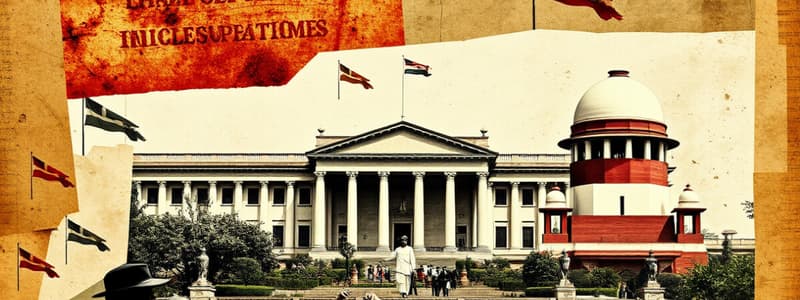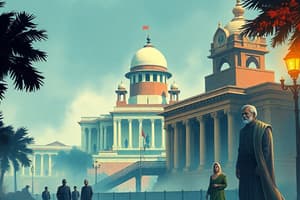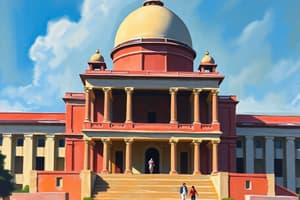Podcast
Questions and Answers
The Supreme Court is located in Mumbai.
The Supreme Court is located in Mumbai.
False (B)
A judge of the Supreme Court must have at least 10 years of experience as an advocate in a High Court.
A judge of the Supreme Court must have at least 10 years of experience as an advocate in a High Court.
True (A)
The Supreme Court consists of the chief justice and 25 other judges.
The Supreme Court consists of the chief justice and 25 other judges.
False (B)
The chief justice and judges of the Supreme Court can be removed by the president at any time.
The chief justice and judges of the Supreme Court can be removed by the president at any time.
The Supreme Court has original jurisdiction over cases involving disputes between states.
The Supreme Court has original jurisdiction over cases involving disputes between states.
Impeachment of a Supreme Court judge requires a simple majority in both houses of Parliament.
Impeachment of a Supreme Court judge requires a simple majority in both houses of Parliament.
The Supreme Court functions solely as a Court of Appeal.
The Supreme Court functions solely as a Court of Appeal.
A judge of the Supreme Court must be an Indian citizen.
A judge of the Supreme Court must be an Indian citizen.
The Supreme Court of India has the authority to issue writs only related to criminal cases.
The Supreme Court of India has the authority to issue writs only related to criminal cases.
A writ of mandamus can be issued against a private individual.
A writ of mandamus can be issued against a private individual.
Judicial review allows the Supreme Court to declare laws void if they conflict with the Constitution.
Judicial review allows the Supreme Court to declare laws void if they conflict with the Constitution.
A High Court judge in India may continue to serve until the age of 65.
A High Court judge in India may continue to serve until the age of 65.
Subordinate courts can only handle civil cases.
Subordinate courts can only handle civil cases.
The High Court has the authority to supervise and control all subordinate courts in the state.
The High Court has the authority to supervise and control all subordinate courts in the state.
The Supreme Court of India functions as a court of record.
The Supreme Court of India functions as a court of record.
A candidate for a High Court judge must have been an advocate for at least 5 years.
A candidate for a High Court judge must have been an advocate for at least 5 years.
The appointment of district judges is made solely by the High Court without consulting anyone.
The appointment of district judges is made solely by the High Court without consulting anyone.
The High Court is the final authority on the interpretation of Indian laws.
The High Court is the final authority on the interpretation of Indian laws.
Study Notes
Judiciary Overview
- The judiciary is the third branch of government, responsible for interpreting laws, punishing law violators, and protecting citizens' rights.
- Comprises three levels: Supreme Court, High Courts, and Subordinate Courts.
The Supreme Court
- Highest court in India, located in Delhi.
- Responsible for interpreting the Constitution and legislative laws.
- Judgements are binding on all lower courts.
Composition and Structure
- Consists of the Chief Justice and 30 other judges.
- Chief Justice is appointed by the President based on council advice.
- Other judges are appointed by the President with advice from both the Council of Ministers and the Chief Justice.
Qualifications for Supreme Court Judges
- Must be an Indian citizen with at least 5 years as a High Court judge or 10 years as a High Court advocate.
- Should be recognized as a distinguished jurist in the President's opinion.
Terms of Office
- Judges serve until 65 years of age.
- Their removal requires proven misbehavior and a two-thirds majority vote in both Houses of Parliament.
Powers and Functions
-
Jurisdiction Types:
- Original jurisdiction: Exclusive right to hear cases involving disputes between states or between states and the union government.
- Appellate jurisdiction: Right to hear appeals from lower High Courts.
- Advisory jurisdiction: Advising the President or interpreting laws prior to signing bills.
-
Judicial Review: The power to interpret the Constitution and declare laws void if conflicting with the Constitution.
-
Court of Record: Maintains permanent records of proceedings, sets legal precedents, and can punish for contempt.
Issuing of Writs
- The Supreme Court can issue writs to enforce rights:
- Habeas Corpus: Protects individuals from illegal detention; court can order release.
- Mandamus: Commands public officials to perform their duty when they fail to do so.
Final Authority
- The Supreme Court's decisions are final and uniform across India, with the exception of military law.
The High Court
- The highest court at the state level, led by a Chief Justice and other judges as deemed necessary by the President.
- Judges are appointed in consultation with the Chief Justice of the Supreme Court and the state governor.
Qualifications for High Court Judges
- Must have held a judicial office or been an advocate for at least 10 years.
Terms of Office
- High Court judges serve until 62 years of age and may resign or be removed by the President. They can also be transferred to different courts.
Functions of High Court
- Issues writs and orders to protect Fundamental Rights.
- Oversees subordinate courts, can demand their records, and ensure uniformity in constitutional interpretation.
Subordinate Courts
- Comprise District and Sessions Courts, Provincial Courts, and Nyaya Panchayats.
- District judges appointed by the Governor with High Court consultation.
- Handle civil (property, contract) and criminal (theft, murder) cases.
- Uniform structure and function across the country, supervised by the state High Courts.
Studying That Suits You
Use AI to generate personalized quizzes and flashcards to suit your learning preferences.
Description
This quiz explores the structure and functions of the Indian judiciary, focusing on the Supreme Court as the highest court in India. It covers the roles of different levels of courts and their importance in interpreting laws and protecting citizens' rights. Test your knowledge about the judiciary system in India!




